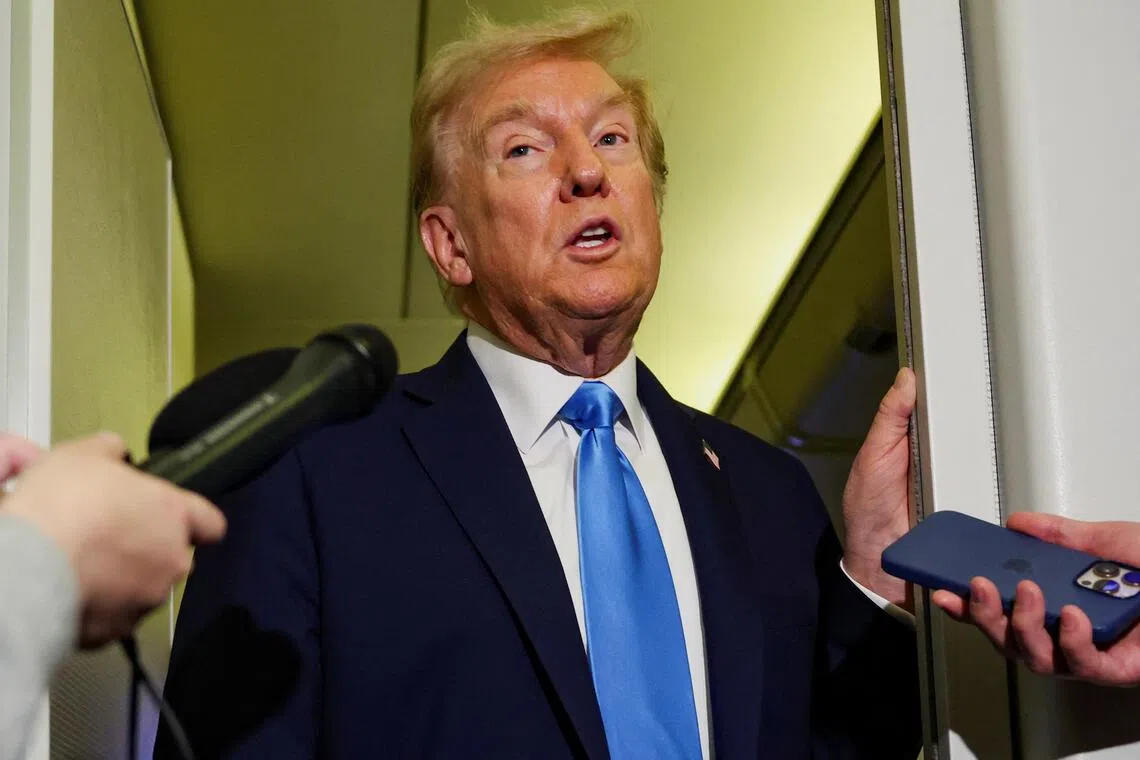Can President Trump serve more than two terms?
Sign up now: Get ST's newsletters delivered to your inbox

Any attempt by US President Donald Trump to seek a third term would test the limits of the 22nd Amendment to the US Constitution.
PHOTO: REUTERS
Follow topic:
WASHINGTON – US President Donald Trump is flirting with extending his stay at 1600 Pennsylvania Avenue.
It is an idea that Mr Trump has frequently teased at rallies over the years, often to ecstatic cheers from supporters. In the past, it could be hard to discern whether these musings were sincere, but in a March 30 interview with NBC’s Ms Kristen Welker, Mr Trump said he was “not joking” about the possibility of serving a third term
“There are methods (with) which you could do it,” he said. “A lot of people want me to do it.”
Allies of the President have earnestly raised the prospect. Mr Steve Bannon, a prominent conservative pundit who formerly served as Mr Trump’s chief strategist, has publicly endorsed the President serving again and has floated scenarios to bypass legal hurdles.
Any attempt by Mr Trump to seek a third term would test the limits of the 22nd Amendment to the US Constitution, which forbids a commander-in-chief from being elected to more than two terms.
Is it legal for a president to run for a third term?
The 22nd Amendment to the Constitution states that “no person shall be elected to the office of the President more than twice.”
The amendment also prohibits anyone who assumes the office of the presidency for more than two years of a term to which he or she was not elected – such as a vice-president who takes over in an emergency – from being elected more than once.
Has any president served more than two terms?
Franklin D. Roosevelt is the only president in US history to serve more than two terms. Congress passed the 22nd Amendment in 1947 after he won the 1944 election, his fourth consecutive presidential victory.
George Washington, the first US president, declined to seek a third term after his second ended in 1797. This practice remained an informal tradition until the passage of the amendment 150 years later.
Could Trump’s allies in Congress change the law?
Changing the 22nd Amendment would require another constitutional amendment.
In January, Republican Representative Andy Ogles introduced an amendment that would allow a former president to be elected to a third presidential term – though only if his or her first two were non-consecutive. This would prevent all living two-term presidents but Mr Trump from being elected.
Mr Trump, however, expressed comfort with facing off against former President Barack Obama, the last two-term Democratic president. I’d love that,” Mr Trump said. “That would be a good one. I’d like that.”
Finding enough Democratic support in the Senate to pass any measure that expands term limits is highly unlikely.
New constitutional amendments have become extremely rare. The most recent, which concerned the pay structure for members of Congress – a non-partisan issue – passed in 1992.
Does Mr Trump have any other possible paths to a third term?
The 22nd Amendment is widely considered to unconditionally prohibit a president from seeking a third term. However, some conservative advocates point out that while the Constitution bars presidents from being “elected” to a third term, it does not explicitly forbid them from serving a third term. They argue that this supposed loophole, untested in court, could allow a two-term president to join another candidate’s campaign as their vice-presidential running mate. If that person won, he or she could step down, and the vice-president would, by law, assume the presidency.
That was one potential “method” that Mr Trump confirmed he was aware of in his March 30 interview: He specifically acknowledged that campaigning as the running mate to his current vice-president, Mr J.D. Vance, could help him reclaim the presidency. He also alluded to “other” strategies, though declined to say what they are.
Professor Michele Goodwin, a constitutional law professor at Georgetown University, said the 22nd Amendment has remained relatively untested since its ratification. Though she doesn’t believe the amendment bars a former president from serving as vice-president, she predicted that the US legal system would not allow a two-term president to assume the presidency again, even through a resignation. She called the theory a “corrupt concept” that would violate the “the spirit behind the amendment.”
Another possible route to the presidency could be through serving as speaker of the House of Representatives: Under the Constitution, the post does not have to be occupied by a member of Congress (though no non-member has ever served in the role). To serve as speaker, a person only has to be nominated by a member of the House and confirmed by a majority of the Chamber’s members. The speaker is second in line for succession to the presidency, which means that if both the president and vice-president were to resign, that unelected person could become president.
A major wild card in any scenario is Mr Trump’s age. At 78, he is already one of the oldest presidents to serve. His predecessor, Mr Joe Biden, who is 82, dropped out of the 2024 presidential election

